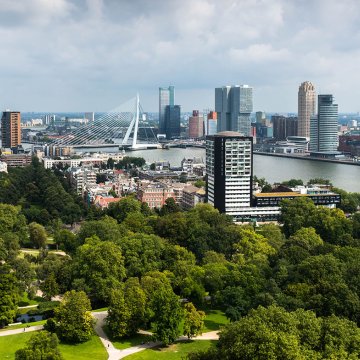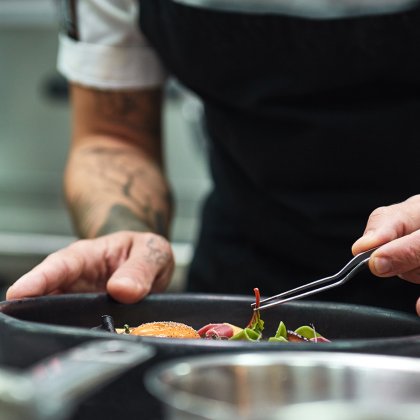
Michelin Green Star Restaurants
The Dutch food scene has long been innovative and exciting. Sustainability and seasonal cooking have come to the fore, with chefs creating extraordinary flavors from hyperlocal ingredients: strong relationships with regional suppliers are the name of the game, and many restaurants even grow their own produce. The quality of this is evidenced by the number of restaurants awarded with a prestigious Michelin Green Star, which rewards high ethical and environmental standards. From idyllic countryside hideaways to glamorous fine dining, these are the best of the Netherlands’ sustainable restaurants.
- Go on a culinary journey, in balance with nature.
- Experience sustainable fine dining across the Netherlands.
- Learn about our seasonal and hyperlocal produce.
Into the country
It makes instinctive sense to venture out into the countryside when in search for sustainable cooking and local produce. Located in a former monastery, Het Seminar in Zenderen in Overijssel is the farm-to-fork ideal come to life: fruit, vegetables, livestock – everything is grown or reared on site. And in its historic farmhouse, set just a stone’s throw from the shores of the North Sea, Hof aan Zee in Koudekerke in Zeeland is serving up the rich produce of the region, including seaweed and fish from the Oosterschelde estuary.
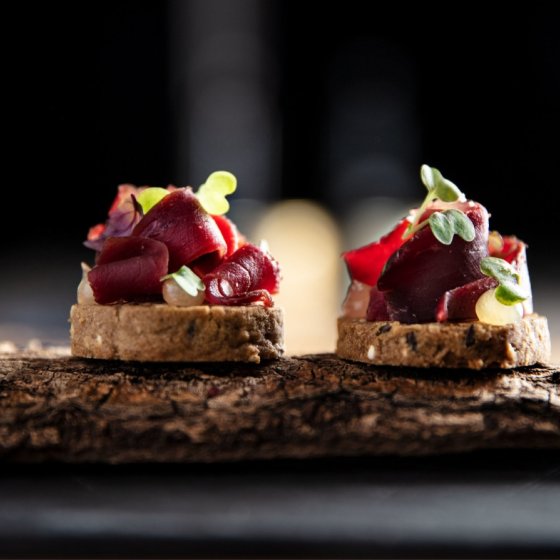
The beautiful Frisian nature is more than a backdrop at Mearkas in Eastermar, a light-filled restaurant surrounded by gardens and fields, which produce the majority of the ingredients. And at Kook Atelier op Oost, the cooking fully embraces its island location, using ingredients from Texel and the Wadden Sea.
Did you know?
That the Netherlands is a leader in sustainable agriculture? This has real impact: it’s the world’s second-largest exporter of agricultural goods.
Going all out
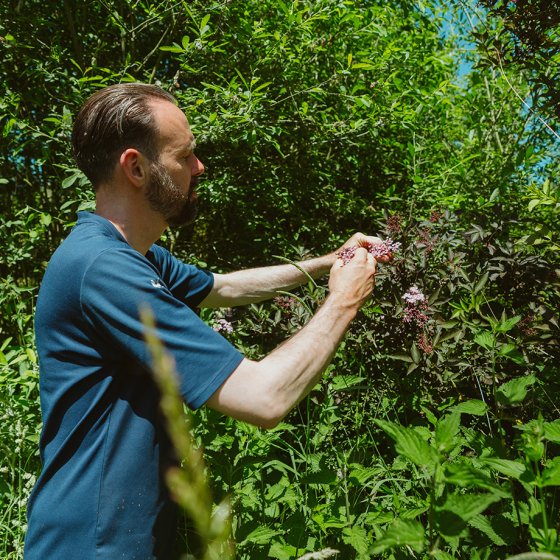
Fine dining and sustainability don’t have to be mutually exclusive, as proven by the impressive list of restaurants in the Netherlands that have both a Michelin Green Star and one (or more!) Michelin Stars. The world’s only vegan restaurant with two Michelin Stars, De Nieuwe Winkel in Nijmegen, is famous for its ‘food forest’, from where its head chef draws inspiration and ingredients. Flore in Amsterdam’s De L’Europe Hotel is renowned for its exceptional cooking, for which it has been awarded two Michelin Stars, and sustainable ethos, with an emphasis on local, biodynamic produce.
Bolenius, also in Amsterdam, has one Michelin Star and offers elegant, light cuisine where vegetables take center stage; produce is harvested daily from the chef’s own kitchen garden. Having held three Michelin Stars since 2004, De Librije in Zwolle has played a not insignificant role in introducing the use of sustainable regional produce, a focus on vegetables and techniques such as fermentation into the world of fine dining. And despite the restaurant’s cool industrial-chic décor, the ingredients of the food at ONE in Roermond (Limburg), awarded with one Michelin Star, are mainly sourced from the chef’s own impressive kitchen garden.
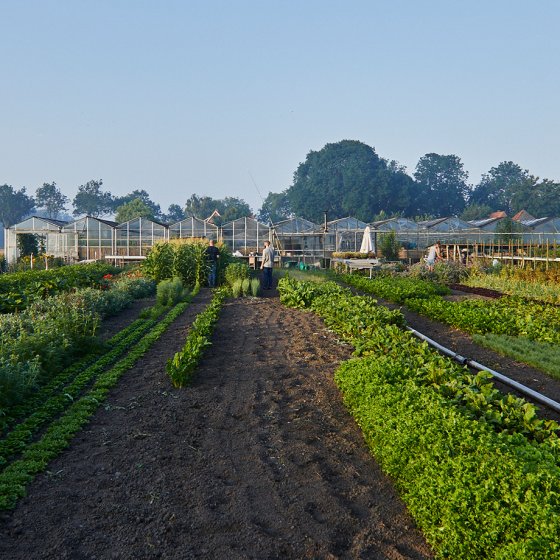
Lutum is located in the historic fortified town of Wijk bij Duurstede and has one Michelin star. The name refers to the fertile, clay-rich soil of the area, and local produce is crucial to their culinary vision. Finally, Amsterdam’s much-loved De Kas, which has one Michelin star, is in a beautiful greenhouse with a lovely garden terrace; the restaurateurs grow hundreds of varieties of vegetables, herbs and fruit on site and in a bigger field in the country.
Hyper-local: showcasing the best regional cuisine
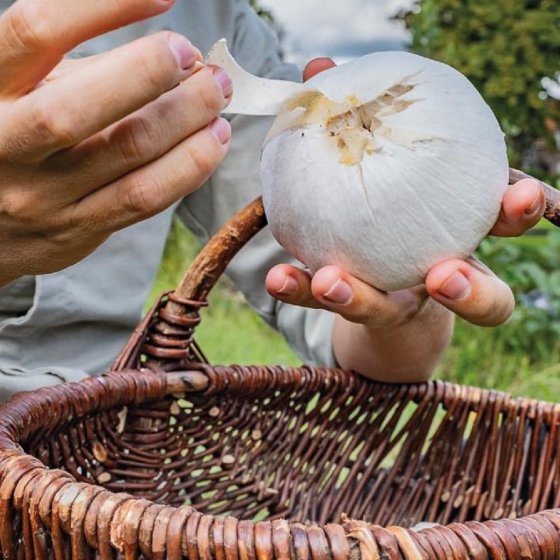
While all sustainable restaurants tend to focus on seasonal and local produce, some make this the central philosophy of their cooking, whether it’s through keeping their own kitchen gardens and food forests or through a strong bond with the culinary traditions of their region. Neder in Alkmaar has a particularly strong commitment to working with local produce: think salt from the Oosterschelde estuary, foraged herbs, Veluwe red deer and mustard seeds from Texel.
At Utrecht’s Héron, seasonality and local produce are also key, as they are at Morille in Zeeland, where only ingredients harvested from their own kitchen garden, foraged in the wild or sourced from producers in the immediate vicinity are used. Aan Sjuuteeänjd in Limburg is a cute organic farmhouse restaurant with its own food forest and vegetable garden and a strong commitment to celebrating forgotten regional vegetables; Lokaal is a zero-waste restaurant in a hotel located in a former school building in Doetinchem in Gelderland.
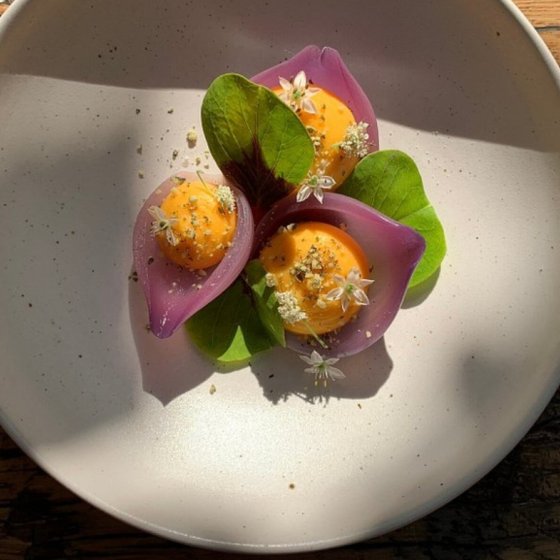
The laid-back feel and creative cooking of Heimat in Utrecht go hand in hand with circular and sustainable ideals. Circularity is also key at Flores in Nijmegen, which used produce from regenerative gardens and strives to minimize waste through the use of fermentation and koji cultures.
We want to move towards a world where there is enough food for everyone, without harming animals, people or the planet itself.
Plant-based, vegetarian and 80/20
The aforementioned De Nieuwe Winkel might be the only vegan restaurant with two Michelin stars on this list, but there are plenty of other options for vegetarians and vegans. Rotonde in Rotterdam offers sophisticated food that’s entirely vegetarian; diners are advised to try for a table near the open kitchen for a view of the action by the wood-fired oven.
Vannu in Bavel in Noord-Brabant has built up a sterling reputation for its vegan, playful yet elegant cooking. And Triptyque in Wateringen in Zuid-Holland is famous for its ‘80/20’ concept, meaning that at least 80% of each dish is plant-based – often more. Its creative cooking, which includes a ‘remarkable’ plant-based steak tartare, has earned it a Michelin star, too.

Tips from Niels van den Berg
-
Asparagus at Brabantse Wal, Ossendrecht
In the asparagus season, visit Brabantse Wal, where white asparagus grows in unique sandy lime soil and sea air. Taste the characteristic, lightly salty asparagus in local restaurants or buy it directly from the growers.
-
Restaurant Vannu, Bavel
Vannu serves refined, plant-based dishes prepared with local vegetables. Chef Gijs Kemmeren uses fermentation and seaweed to achieve deep umami flavors and the restaurant has been awarded a Green Michelin Star for sustainable, innovative gastronomy.
-
De Oesterij, Yerseke
This family-owned business has been farming sustainable oysters in the Oosterschelde estuary since 1906. Enjoy freshly harvested oysters, mussels and other shellfish directly on site, enjoying the view of the historic oyster beds.
